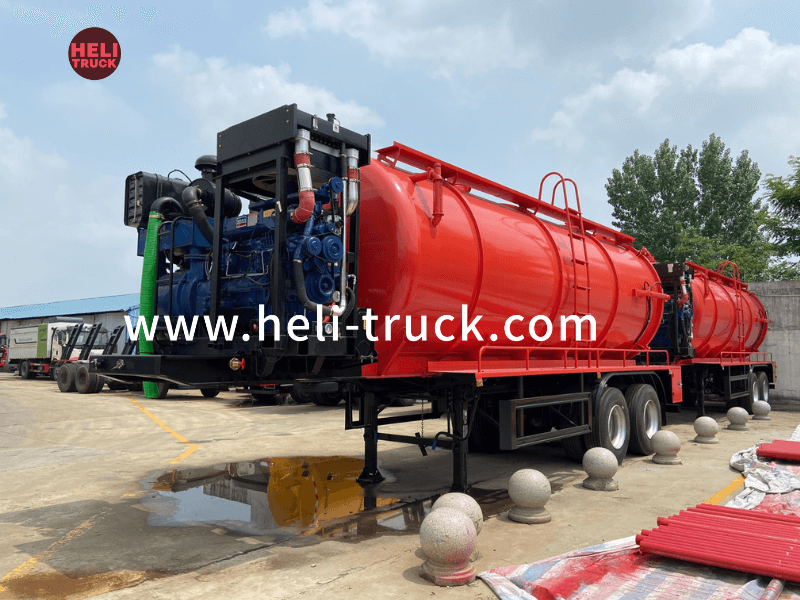Introduction
Garbage compactor trucks play a crucial role in waste management systems worldwide. These specialized vehicles are designed to collect, compress, and transport solid waste efficiently. One of the key factors that determine the performance and effectiveness of a garbage compactor truck is its weight. In this article, we will delve into the various aspects of garbage compactor truck weight, including its impact on performance, fuel efficiency, safety, and regulations.
Understanding Garbage Compactor Trucks
Before delving into the weight aspect, let's first understand the basic functioning of garbage compactor trucks. Water tank truck capacity are equipped with a hydraulic mechanism that compresses the collected waste to maximize the volume of garbage that can be transported in each trip. The compacting process reduces the number of trips required to empty the bins, thereby increasing operational efficiency.
Garbage compactor trucks come in various sizes and configurations, ranging from small rear-loading compactors to large front-loading models used for commercial and industrial waste collection. The choice of truck size depends on the volume and type of waste generated in a particular area. Larger trucks are typically used in urban areas with high population density and commercial establishments, while smaller trucks are suitable for residential neighborhoods and narrow streets.
Factors Affecting Garbage Compactor Truck Weight
Several factors contribute to the overall weight of a garbage compactor truck. These include:
1. Chassis: The chassis is the structural framework of the truck that supports the body, engine, and other components. The material and design of the chassis determine its weight-bearing capacity and overall durability.
2. Body: The body of the garbage compactor truck is where the waste is stored and compacted. The material used in the construction of the body, such as steel or aluminum, affects its weight and strength.
3. Compaction Mechanism: The hydraulic system responsible for compressing the waste plays a significant role in the weight of the truck. The size and power of the compactor mechanism impact the overall weight of the vehicle.
4. Engine: The engine size and type influence the weight of the garbage compactor truck. A more powerful engine may add to the overall weight but can enhance the truck's performance and efficiency.
5. Accessories: Additional features and accessories, such as safety equipment, lighting, and communication devices, contribute to the weight of the truck.
Impact of Weight on Performance
The weight of a garbage compactor truck has a direct impact on its performance and operational efficiency. Here are some key points to consider:

1. Payload Capacity: The weight of the truck determines its payload capacity, i.e., the maximum amount of waste it can carry. A heavier truck may have a higher payload capacity but may also consume more fuel and require stronger braking systems.
2. Maneuverability: The weight distribution of the truck affects its maneuverability on narrow streets and tight corners. Heavier trucks may be more challenging to navigate in urban areas with limited space.
3. Fuel Efficiency: The weight of the garbage compactor truck influences its fuel consumption. Heavier trucks typically consume more fuel, leading to higher operating costs and carbon emissions.
4. Braking and Suspension Systems: The weight of the truck impacts the performance of its braking and suspension systems. Heavier trucks require stronger brakes and suspension components to ensure safe operation.
Regulations and Standards
Government regulations and industry standards play a crucial role in determining the permissible weight limits for garbage compactor trucks. These regulations are designed to ensure road safety, protect infrastructure, and minimize environmental impact. Here are some key regulations related to garbage compactor truck weight:
1. Gross Vehicle Weight Rating (GVWR): The GVWR is the maximum weight limit specified by the manufacturer for a fully loaded vehicle, including passengers, cargo, and fuel. Exceeding the GVWR can lead to safety hazards and legal consequences.
2. Axle Weight Limits: Many jurisdictions have specific weight limits for individual axles to prevent overloading and road damage. Garbage compactor trucks must comply with these axle weight regulations to avoid fines and penalties.
3. Weight Enforcement: Law enforcement agencies conduct weight enforcement checks to ensure that commercial vehicles, including garbage compactor trucks, comply with weight regulations. Violations can result in fines, vehicle impoundment, and loss of operating licenses.
Conclusion
In conclusion, the weight of a garbage compactor truck is a critical factor that impacts its performance, efficiency, and compliance with regulations. Understanding the various components that contribute to the overall weight of the truck is essential for waste management companies, municipalities, and operators. By optimizing the weight of garbage compactor trucks and adhering to weight regulations, stakeholders can enhance operational efficiency, reduce costs, and promote road safety.
